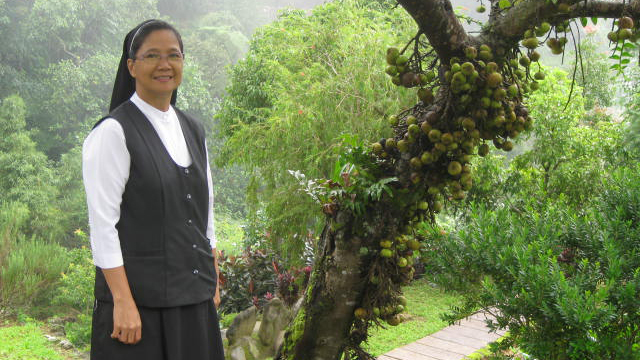The Philippines has experienced severe human rights violations in the past decades, especially linked to the “war on drugs” by former President Duterte (2016-2022). His term was defined by threats, extrajudicial killings, enforced disappearances, and harassment of human rights defenders.
Meet Sister Susan Esmile SFIC, who belongs to the Congregation of the Franciscan Sisters of the Immaculate Conception.* In 2008, she was assigned as the Justice, Peace and Integrity of Creation Coordinator of the Philippine North Province. Since then, she has worked to protect people at risk, feed the poor, strengthen communities, and support the victims of injustice.
What are the main human rights issues in the Philippines and how do these relate to your work?
Violations of the right to life, right to food, clean water, and shelter, as well as corruption, are the main human rights issues in the Philippines. People living in poverty are the most vulnerable, and when they are not able to study or lack better opportunities, they sometimes can fall into the trap of selling drugs. During Duterte’s “war on drugs”, thousands of people disappeared or were found dead. Under Operation “Tokhang”, the police were allowed to raid suspects’ homes without a warrant.
They were supposed to persuade them to surrender and stop their illegal activities. In reality, most of them were unlawfully killed, often in their own homes. We visited the wake of the victims and tried to console the bereaved families with our presence. We gave a little financial help to the poorest, especially when those killed were the families’ breadwinners. We tried to organize and gather the families of the victims living in the same area and referred them to other institutions that can help them address their traumas.
What inspired you to start work on human rights issues, and how does it connect to your calling as a Franciscan Sister?
For me, our commitment to God means embracing the cause or the mission of Christ. This means the protection of life, feeding the hungry, clothing the naked, freeing the captives, etcetera. It is a tall order for me if I want to be Christ’s disciple. Believing that Saint Francis of Assisi has followed Jesus and the Gospel almost verbatim, I feel that this is also my calling – to be faithful in following his example of total dedication to the cause of Christ.
Can you give examples of people you helped protect?
Many people were being hunted or run after by the military because of their political orientation or because they witnessed extrajudicial killings. In 2007, a corruption scandal involving then-President Gloria Macapagal Arroyo was exposed by Mister Rodolfo Jun Lozada. He received many death threats from the people involved in that scandal, so I was usually the one to accompany him to the hearings.
We also took care of the family of a young girl who witnessed the killing of Kian de Los Santos, one of the numerous victims of the “Tokhang”. For more than a year, we accompanied the witness at court hearings to ensure her safety and give her moral support. Of course, there was always the risk of being caught by the police, the military, or vigilantes while transporting the person from one place to another, especially if it was someone high-profile.
What is your proudest achievement?
I invited victims of human trafficking and families of the victims of Duterte´s war on drugs, and I asked them to share their experiences with the sisters as a way of helping them release their pains and sufferings and to find support from them. As for the sisters, it made them more aware of what is happening in our society so that their prayers for the victims of injustice are more concrete after meeting personally and hearing first-hand experiences of the victims. During the pandemic, we also asked for donations and worked with some groups and individuals in providing help: goods like rice, canned goods, and vegetables, through community pantries to the poor, especially those who have lost their jobs.
According to you, what is the difference between charity and human rights work? And do you think they complement each other?
Charity and human rights are similar in many obvious ways. They are both acts of compassion and recognition of the dignity of the individual person. But charity is more about giving material goods to the poor whereas human rights work is addressing the roots of their suffering. There is no obligation to charity. Human rights work is something more – it is a necessary commitment.
* The SFIC is a member of the Association of Major Religious Superiors in the Philippines (AMRSP) now called the Conference of Major Superiors in the Phils (CMSP). One of the mission partners of this institution is the Justice, Peace, and Integrity of Creation Commission (JPICC) whose members are the JPIC representatives from the different member congregations.

